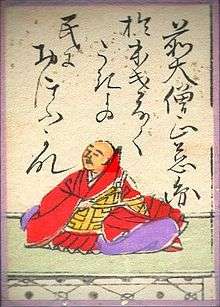Jien
| Jien | |
|---|---|
 Jien in the Hyakunin Isshu. | |
| Born |
May 17, 1155 Kyoto |
| Died |
October 28, 1225 (aged 70) Omi (now Shiga) |
| Occupation | Buddhist monk |
| Genre | history, poetry |
| Subject | Japanese history |
Jien (慈円, 17 May 1155 in Kyoto – 28 October 1225 in Omi (now Shiga) was a Japanese poet, historian, and Buddhist monk.[1]
Biography
Jien was the son Fujiwara no Tadamichi, a member of the Fujiwara family of powerful aristocrats. He joined a Buddhist monastery of the Tendai sect early in his life, first taking the Buddhist name Dokaie, and later changing it to Jien. He eventually rose to the rank of Daisōjō (大僧正, "Archbishop"), or leader of the Tendai sect.
He began to study and write Japanese history, his purpose being to "enlighten people who find it hard to understand the vicissitudes of life". His masterpiece, completed around 1220, was humbly entitled, Gukanshō, which translates as Jottings of a Fool. In it he tried to analyze the facts of Japanese history. The Gukanshō held a mappo and therefore pessimistic view of his age, The Feudal Period, and claimed that it was a period of religious decline and saw the disintegration of civilization. This is the viewpoint generally held today. Jien claimed that changes in the feudal structure were necessary and defended the shogun's claim of power.
As a poet, he was named one of the New Thirty-six Poetry Immortals, and was the second-best represented poet in the Shin Kokin Wakashū. He was included by Fujiwara no Teika in the Ogura Hyakunin Isshu.
See also
References
Bibliography
- Brown, Delmer and Ichiro Ishida, eds. (1979). [ Jien (1221)], Gukanshō; "The Future and the Past: a translation and study of the 'Gukanshō,' an interpretive history of Japan written in 1219" translated from the Japanese and edited by Delmer M. Brown & Ichirō Ishida. Berkeley: University of California Press. ISBN 0-520-03460-0
- Encyclopædia Britannica 2005 Ultimate Reference Suite DVD, article- "Jien"
- Mostow, Joshua S., (1996) Pictures of the Heart: The Hyakunin Isshu in Word and Image, pp. 421–422
- Robert, Jean-Noël (2008). La Centurie du Lotus: poèmes de Jien (1155-1225) sur le Sûtra du Lotus; Paris: Collège de France, Institut des hautes études japonaises. ISBN 9782913217195